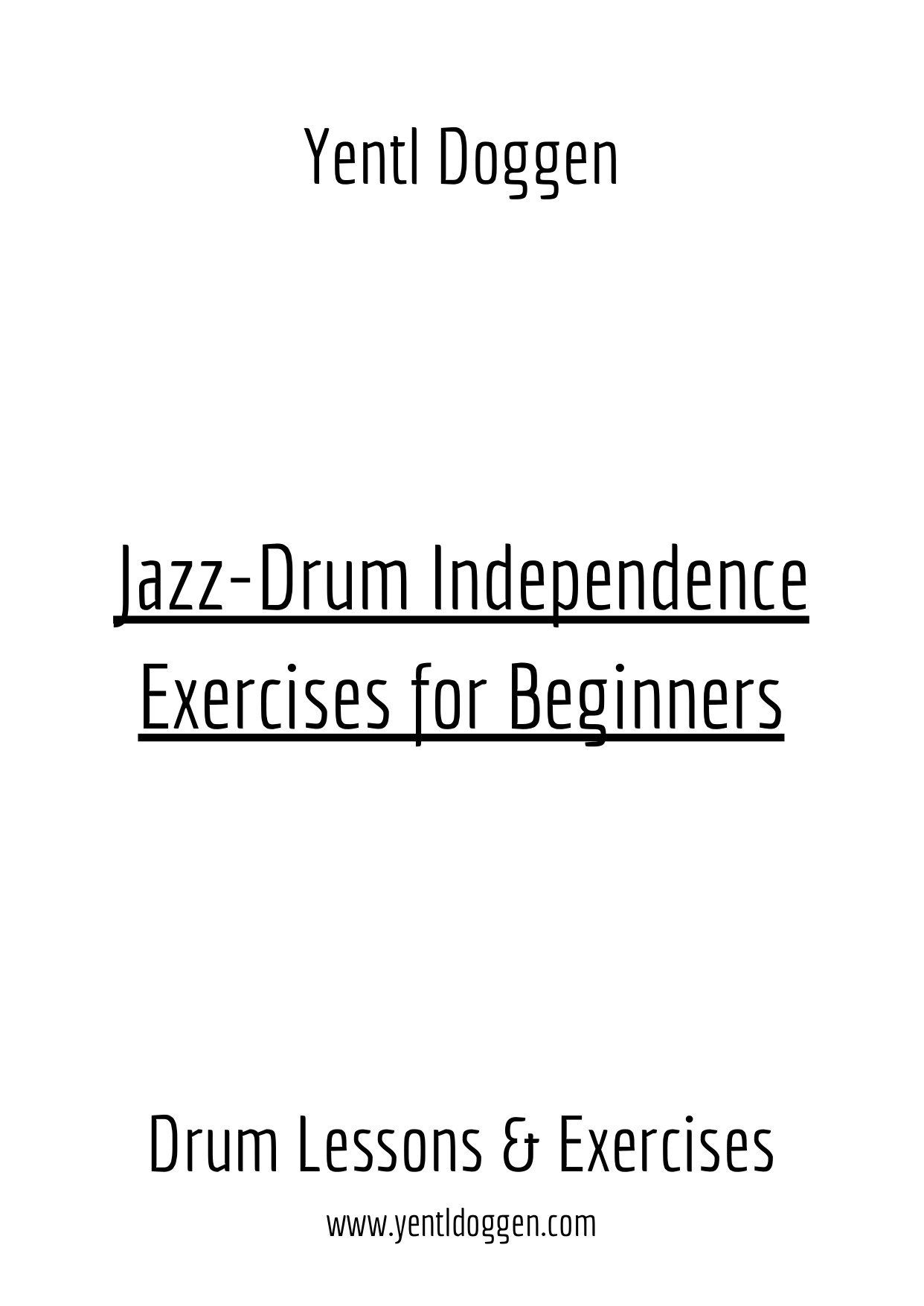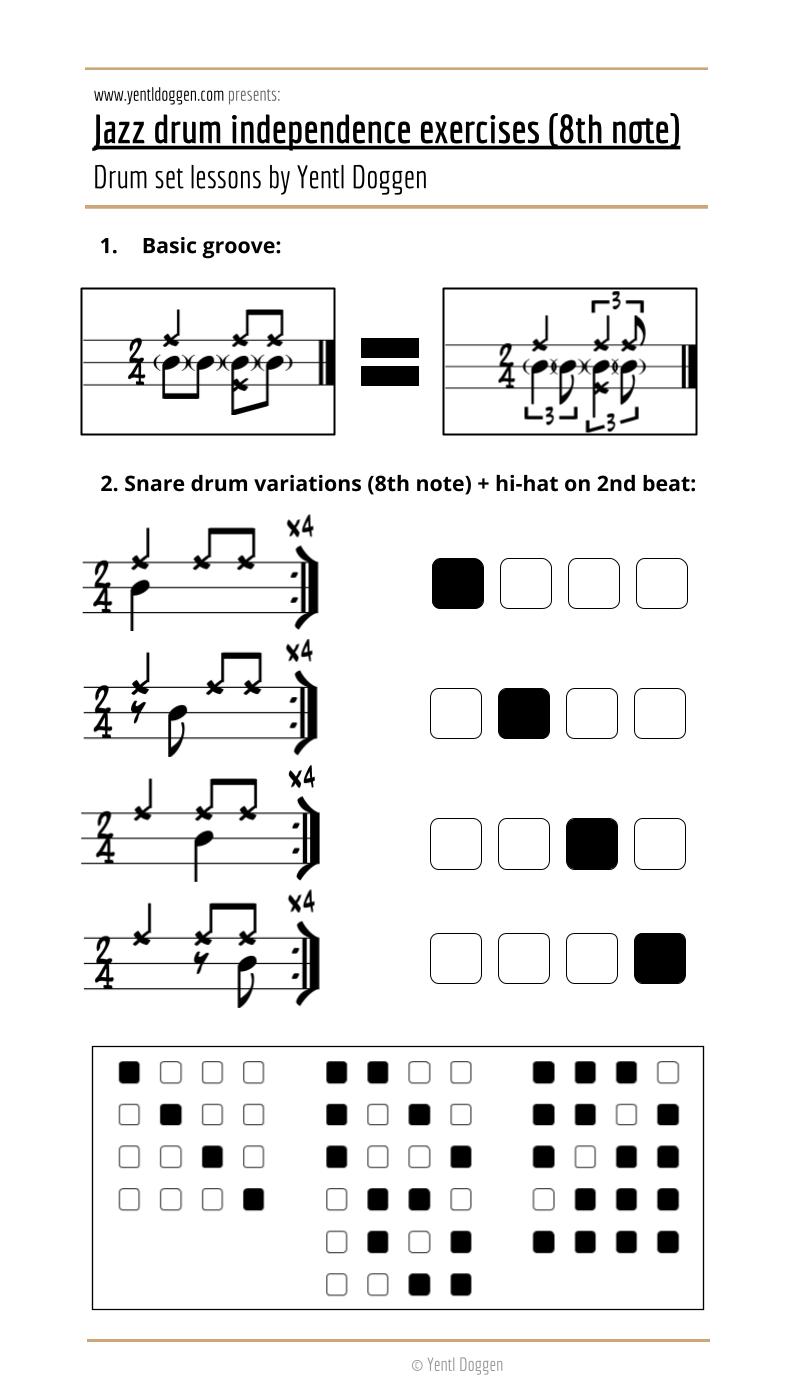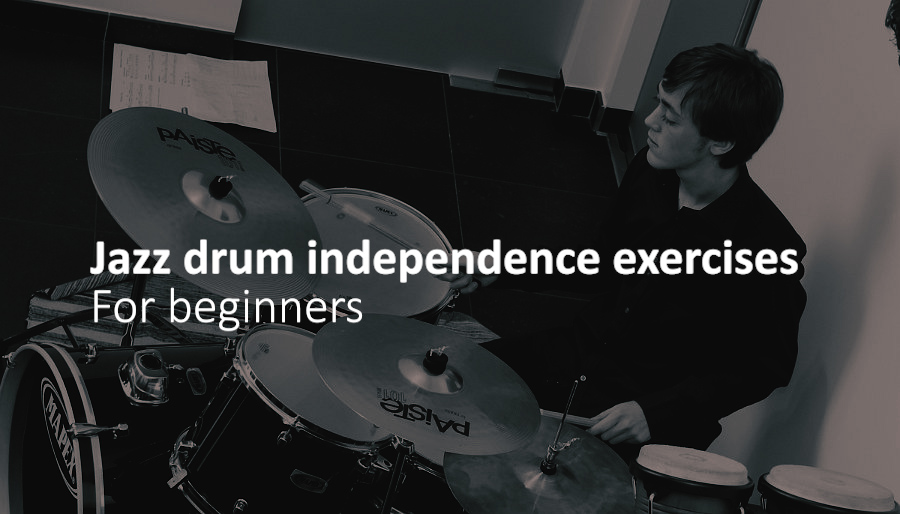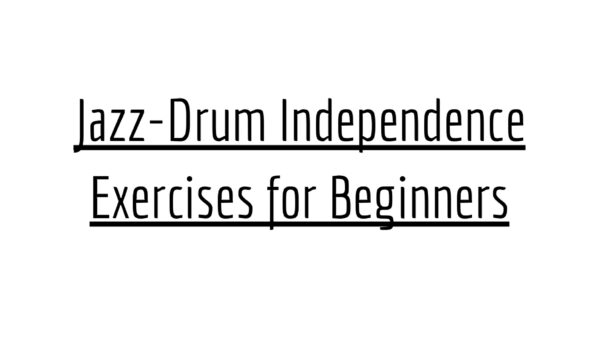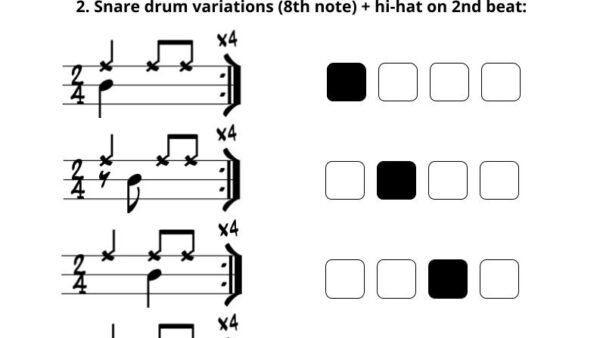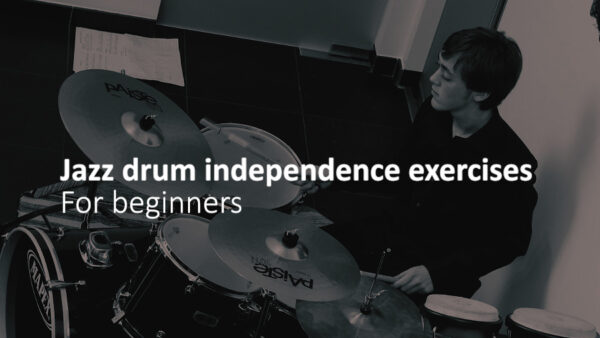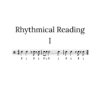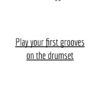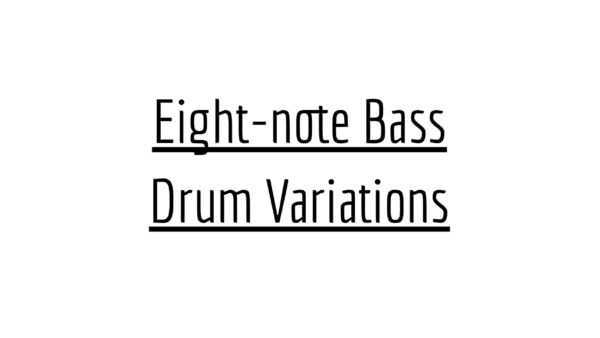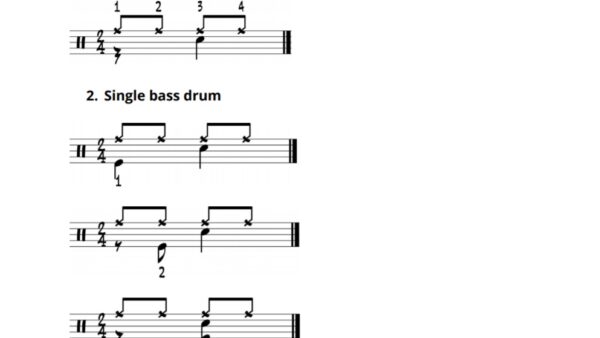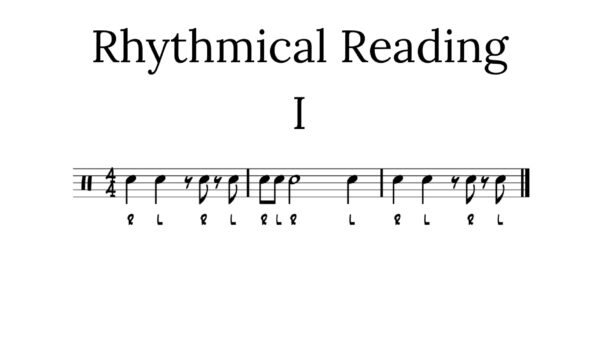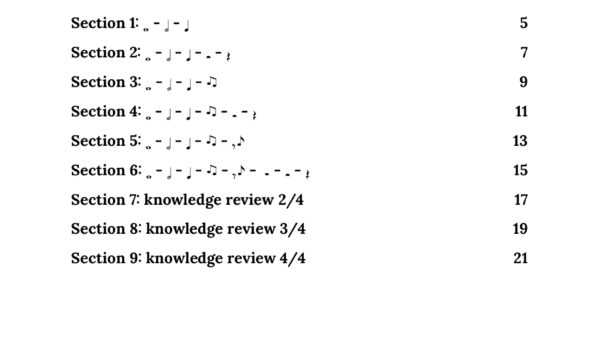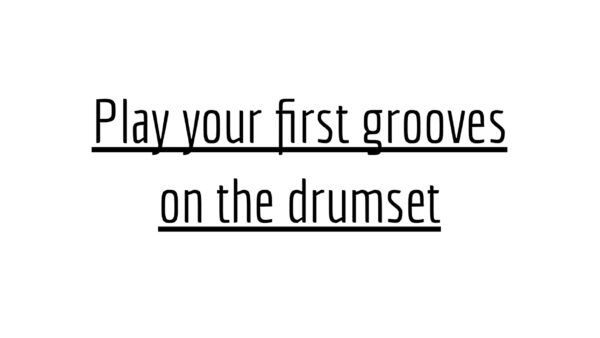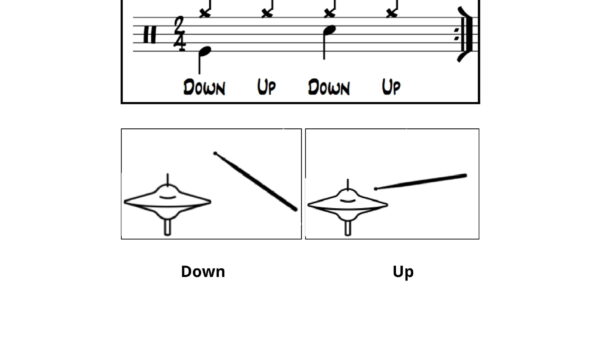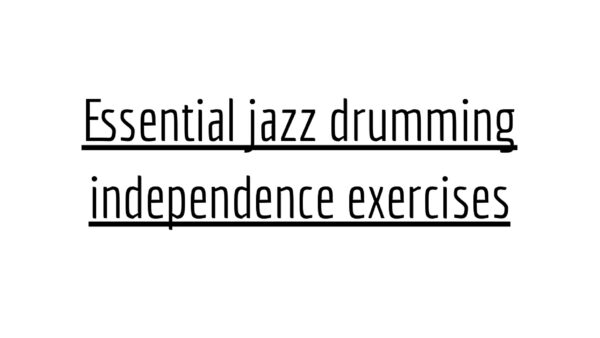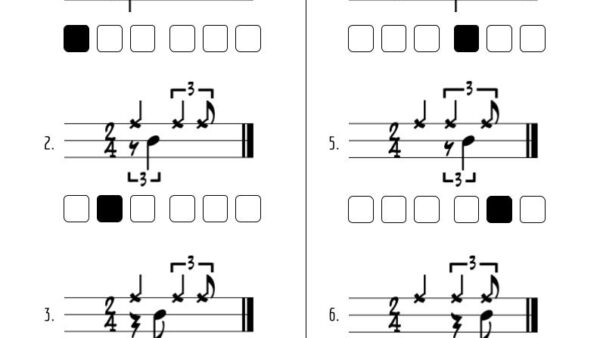Jazz-drum independence exercises for beginners | PDF & MP3 (play-along) download
€1,00
Upon ordering these Jazz-drum independence exercises for beginners, you get a downloadable link containing 2 copies. The link will be valid for 365 days.
What’s included?
-High-definition PDF downloads.
-Example MP3 tracks.
-Play-along MP3 track.
-Full Size: Permutations (4) PDF
Jazz-drum independence exercises for beginners
1. Jazz-drum independence exercises – Snare drum (8th note).
The first drum lesson focuses on snare drum independence. Exercise one shows the fundamental swing groove we will use in this entire exercise. Although the notation is straight in the first cell and throughout the exercises, the practice should be played in a swing feel, as the second cell shows. The snare drum notes are between brackets, so this basic swing groove only consists of the ride-cymbal in the right hand and the hi-hat on the second beat in the left foot. The hi-hat is not notated in the second exercise but should be played consistently on the second beat.
In exercise two, we add the snare drum. The first snare drum comes together with the first ride-cymbal. After that, the snare drum moves to the second eight-note, which is technically the third triplet as this is played in a swing feel and moves to the third and fourth eight notes, going over all the single eight-note snare drum options. Exercise two shows two different notations. The image on the left represents the classical drum notation. The image on the right is for the accompanying permutational visualisation. To finish this first drum lesson, we must complete the table at the end of the page according to the same principles above. Two black dots stand for two snare drums, and three black dots for three snare drums.
2. Jazz-drum independence exercises – Bass drum (8th note).
The second drum lesson focuses on bass drum independence. Exercise one shows the fundamental swing groove we will use in this entire exercise. Although the notation is straight in the first cell and throughout the exercises, the practice should be played in a swing feel, as the second cell shows. The bass drum notes are between brackets, so this basic swing groove only consists of the ride-cymbal in the right hand and the hi-hat on the second beat in the left foot. The hi-hat is not notated in the second exercise but should be played consistently on the second beat.
In exercise two, we add the bass drum. The first bass drum comes together with the first ride-cymbal. After that, the bass drum moves to the second eight-note, which is technically the third triplet as this is played in a swing feel and moves to the third and fourth eight notes, going over all the single eight-note bass drum options. Exercise two shows two different notations. The image on the left represents the classical drum notation. The image on the right is for the accompanying permutational visualisation. To finish this first drum lesson, we must complete the table at the end of the page according to the same principles above. Two black dots stand for two bass drums, and three black dots for three bass drums.
3. Jazz-drum independence exercises – Hi-hat (8th note).
The third drum lesson focuses on hi-hat independence in the left foot. Exercise one shows the fundamental swing groove we will use in this entire exercise. Although the notation is straight in the first cell and throughout the exercises, the practice should be played in a swing feel, as the second cell shows. The hi-hat notes are between brackets, so this basic swing groove only consists of the ride-cymbal in the right hand and a snare drum rim click on the second beat in the left hand.
In exercise two, we add the hi-hat to the left foot. The first hi-hat comes together with the first ride-cymbal. After that, the hi-hat moves to the second, the third and fourth eight-note. Therefore, going over all the single eight-note hi-hat options. Exercise two shows two different notations. The image on the left represents the classical drum notation. The image on the right is for the accompanying permutational visualisation. To finish this first drum lesson, we must complete the table at the end of the page according to the same principles above. Two black dots stand for two hi-hats, and three black dots for three hi-hats.
Drum Lessons Exercises:
There are multiple essays to write about the benefits of drumming. Playing the drum set reduces stress, develops coordination, activates brain power and makes you feel like a rockstar. Besides, drumming is just incredibly fun, and so is learning new things. From the start, I was always interested in writing drum lessons and exercises for other drummers to keep expanding their skills behind the drum set. There is so much to learn, and there are so many ways to do it. On this page, I will regularly share exercises and lessons for beginners, intermediate and expert drummers to enjoy and grow their knowledge!
My Drum Lessons:
Quality is the number one priority on my website, ensuring that all the drum lessons and exercises on this page or of high quality. Depending on the number and quality of drum activities, some parts are free, and some come as premium products or e-books. All downloads are standard in high-definition PDF or MP3 formats, and you can access two downloads valid for 365 days in your account, reachable on this website or by the email you will receive afterwards. Feel free to message me on the contact page if you have other questions! Start exploring below to find the right fit for you!
About Me:
After finishing my master’s in drums & percussion and a bachelor’s in jazz studies, I started teaching music in my home country, Belgium. When commencing my world travels at the beginning of 2019, I took the opportunity to teach wherever my travels would bring me. Consequently, I have taught music and drum lessons in plenty of places over the past few years. I always did everything possible at every school to ensure my students had the best education possible. Moreover, I started to write Drum Lessons and Drum Transcriptions to give my students everything they need to become great musicians.
Online Education:
There are multiple ways to keep up-to-date with the posts on my website. The monthly newsletter always includes the latest posts right in your inbox. That includes posts out of the travel, music and online education sections. To never miss an update, please ensure to subscribe to my newsletter. If you rather have the updates in your Facebook feed, I suggest following that page. To look at my daily travel and music life, you can also follow my Instagram page. Hope to see you soon


